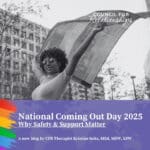National Coming Out Day: Why Safety & Support Matter
Each year, National Coming Out Day offers a powerful opportunity to celebrate LGBTQIA+ identity, affirm individual journeys, and advocate for inclusive care. For those navigating intersecting identities, the decision to come out may be shaped by safety, readiness, or support—and what feels like a safe choice for one person may not for another. This blog explores the emotional landscape of coming out, the importance of creating a safe place for all people, and how allies and institutions can help build a world where everyone feels seen, valued, and free to be themselves.
Why National Coming Out Day Matters
October 11 is recognized each year as National Coming Out Day, a time to celebrate and affirm LGBTQIA+ identities. The day was first observed in 1988, marking the anniversary of the 1987 National March on Washington for Lesbian and Gay Rights. Since then, it has become an annual opportunity to raise awareness, highlight visibility, and honor the courage of those who choose to share their authentic selves with others.
National Coming Out Day is more than a date on the calendar; it is a cultural marker of progress and a reminder of ongoing work. It also calls us to build a safe place in our families, schools, and workplaces.
While there has been important progress over the years, the current climate reflects increasing hostility toward LGBTQIA+ communities, particularly trans and non-binary people. This reality makes days of recognition and support even more important as a visible counter to the harmful narratives many face, while also uplifting the joy and resilience of LGBTQIA+ people.
The Power of Coming Out
For many, coming out is a profoundly affirming act. It can mean stepping into greater authenticity, building stronger connections, and finding community support. National Coming Out Day shines a light on the resilience and bravery of LGBTQIA+ individuals and reminds us of the importance of inclusive spaces where people can thrive without fear of rejection.
Visibility as a Lifeline
Coming out can also create a ripple effect: when one person shares their identity, it often encourages others to live more openly too. For example, hearing a colleague, classmate, or family member share their story can inspire others to embrace their own truths, creating a chain of courage and connection.
In today’s environment, such acts of visibility take on even more weight, as representation can serve as a lifeline for those who feel isolated or targeted, particularly for people holding multiple marginalized identities. These moments of visibility help establish a safe place for connection and support.
When Coming Out Is Not a Safe Choice
At the same time, it is important to acknowledge that coming out is not the right or safe choice for everyone. Factors such as family acceptance, workplace protections, cultural context, and personal readiness all shape whether, when, and how someone might share their identity. Choosing not to come out, or waiting until it feels safe, is equally valid.
Every Journey Deserves Respect
Every journey is deeply personal. Some may come out in one space but not another, while others may never feel the need to share broadly. National Coming Out Day affirms that self-knowledge and self-acceptance are powerful, regardless of disclosure. Waiting or choosing privacy can be a safe choice that protects well‑being until circumstances change.
In a climate where LGBTQIA+ rights and identities are being challenged, protecting one’s safety and mental health must always come first. For those with intersecting identities, weighing risks is often even more complex.
“There is no one right timeline or path; every journey of coming out, or not, is valid.”
How Intersecting Identities Impact Coming Out
It is also essential to recognize that experiences of coming out are shaped by intersectionality. People who hold multiple marginalized identities, such as LGBTQIA+ individuals who are also people of color, immigrants, people with disabilities, or members of certain faith communities, often face additional barriers. These may include racism, xenophobia, ableism, or religious stigma layered on top of homophobia and transphobia.
The Risk of Rejection—and the Strength of Resilience
For these individuals, the risks of rejection or discrimination can be higher, and safe spaces may feel harder to find. At the same time, communities with intersecting identities often show remarkable resilience, building networks of care and advocacy that model strength in the face of adversity. National Coming Out Day calls attention not only to the courage of individuals but also to the need for broader systemic change that addresses overlapping forms of oppression.
Creating a Safe Place on National Coming Out Day—and Beyond
National Coming Out Day also reminds us that the responsibility of creating safe environments does not fall only on LGBTQIA+ individuals. Families, schools, workplaces, and communities play a critical role in making affirmation and inclusion the norm. Acts as simple as using correct pronouns, displaying visible allyship, and speaking out against discrimination can make it safer for someone to share who they are.
Institutional and Community Responsibilities
Beyond individual actions, systemic change is key. Policies such as inclusive training for staff, clear non-discrimination protections, and equitable healthcare benefits create the foundation for genuine inclusion. At Council for Relationships, our DEIAB efforts are centered on strengthening these supports and deepening our commitment to equity, particularly at a time when national conversations too often threaten the rights and dignity of LGBTQIA+ people. For those with intersecting marginalized identities, institutional responsibility is especially critical.
Mental Health, Identity, and National Coming Out Day
It is equally important to recognize the mental health aspects of coming out. The process can bring feelings of relief and empowerment, but it can also surface anxiety, fear, or grief if met with rejection. Mental health professionals and supportive communities are vital in helping individuals navigate these emotions, and in ensuring that no one has to face them alone.
Affirming Support as a Lifeline
Therapy and peer support groups can provide a safe place to process these experiences. When affirming care is available, it reduces stigma and fosters resilience, allowing individuals to move forward with greater confidence and well-being. With growing pressures and hostility in public discourse, affirming care becomes even more critical, especially for those managing the compounded stress of multiple marginalized identities.
How to Be an Ally on National Coming Out Day
For allies, National Coming Out Day is an invitation to listen, learn, and show up. Allyship is not a single action but an ongoing commitment to advocacy and support. By honoring the courage of those who come out, and respecting the choices of those who do not—including the safe choice not to disclose—we can work toward a world where everyone is free to live openly and authentically.
What Consistent Support Looks Like
Allies can amplify voices, challenge discrimination, and foster inclusion in everyday spaces. This might mean advocating for inclusive policies at work, educating oneself about LGBTQIA+ history, or simply offering nonjudgmental support to friends and loved ones. Consistent allyship is especially important for individuals who face overlapping forms of discrimination.
“Your consistent support as an ally can change lives.”
A Final Reflection on National Coming Out Day
On this National Coming Out Day, we honor the diversity of LGBTQIA+ experiences. Whether coming out today, years ago, or not at all, every journey is valid, and every person deserves to feel safe, affirmed, and celebrated.
This day is a reminder that visibility and acceptance are collective responsibilities. At CFR, we are committed to deepening our DEIAB work and building a network of support, especially in a time when LGBTQIA+ communities, and trans communities in particular, face increasing scrutiny and harm. We also recognize that intersectionality shapes these experiences, and those living with multiple marginalized identities may face unique risks and barriers that require even greater care and support.
Together, we can create spaces of belonging so that all people are free to embrace who they are with courage, joy, and hope.
Editor’s Note: This blog represents the author’s professional perspective and aligns with CFR’s ongoing commitment to Diversity, Equity, Inclusion, Access, and Belonging.
About New Jersey Therapist Kristine Seitz, MEd, MSW, LSW
Kristine Seitz, MEd, MSW, LSW, is a Staff Therapist and the DEIAB Manager at Council for Relationships. She provides individual, couples, and family therapy online across New Jersey. Kristine specializes in gender and sexuality, grief and loss, family stress, trauma, and life transitions. Her clients include adolescents, adults, and families navigating complex experiences and intersecting identities. As a queer clinician with a background in education and nonprofit work, Kristine is deeply committed to creating a safe place for self-discovery, healing, and connection.
If you’re looking for a therapist who brings warmth, curiosity, and a strong foundation in DEIAB-informed care, you can request an appointment with Kristine or get matched with another CFR therapist today.
More from Council for Relationships
Council for Relationships is proud to honor the courage, complexity, and resilience of LGBTQIA+ people—on National Coming Out Day and every day. Whether you’re seeking affirming therapy, exploring questions of identity, or looking for support as an ally, CFR is here for you. Our team of over 60 therapists and psychiatrists across PA and NJ offers expert, integrated care that centers connection, safety, and belonging.
We believe that finding the right therapist should feel like a safe choice—never something you have to navigate alone. Explore our clinician directory, sign up for our newsletters, or read more blogs about mental health, identity, and inclusive care. Let’s work together to build stronger relationships and more connected communities.


